-
 Bitcoin
Bitcoin $82,509.8850
-2.52% -
 Ethereum
Ethereum $1,800.3816
-3.46% -
 Tether USDt
Tether USDt $0.9996
-0.02% -
 XRP
XRP $2.0537
-1.80% -
 BNB
BNB $589.5226
-1.44% -
 USDC
USDC $1.0000
0.02% -
 Solana
Solana $116.3439
-6.85% -
 Dogecoin
Dogecoin $0.1595
-5.58% -
 Cardano
Cardano $0.6479
-2.79% -
 TRON
TRON $0.2366
-0.33% -
 Toncoin
Toncoin $3.5766
-9.59% -
 UNUS SED LEO
UNUS SED LEO $9.3922
-0.34% -
 Chainlink
Chainlink $12.7758
-5.57% -
 Stellar
Stellar $0.2586
-2.92% -
 Avalanche
Avalanche $18.1038
-3.99% -
 Sui
Sui $2.2274
-5.69% -
 Shiba Inu
Shiba Inu $0.0...01219
-1.98% -
 Hedera
Hedera $0.1627
-3.05% -
 Polkadot
Polkadot $4.0427
-1.01% -
 Litecoin
Litecoin $82.8658
-2.85% -
 MANTRA
MANTRA $6.3993
1.10% -
 Bitcoin Cash
Bitcoin Cash $298.9153
-0.95% -
 Bitget Token
Bitget Token $4.4795
-2.24% -
 Dai
Dai $0.9999
0.01% -
 Ethena USDe
Ethena USDe $0.9994
-0.04% -
 Hyperliquid
Hyperliquid $11.7782
-8.21% -
 Monero
Monero $212.0245
-3.58% -
 Pi
Pi $0.5720
-14.14% -
 Uniswap
Uniswap $5.8118
-4.56% -
 Aptos
Aptos $5.0504
-4.12%
What are the main differences between blockchain and traditional databases?
Blockchain's immutable, decentralized structure enhances security and transparency but sacrifices scalability and querying efficiency compared to traditional databases.
Mar 26, 2025 at 10:50 pm
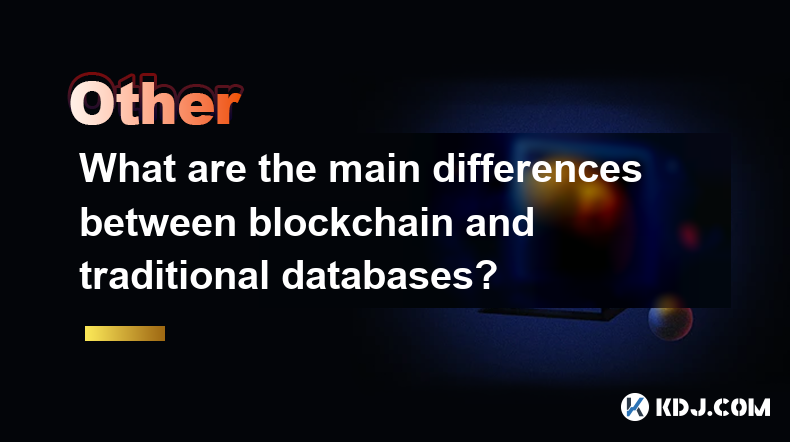
Core Distinctions: Blockchain vs. Traditional Databases
Traditional databases and blockchains, while both storing data, operate under fundamentally different architectures and principles. Understanding these differences is crucial for appreciating the unique capabilities and limitations of each technology. The core distinctions lie in data structure, accessibility, and the mechanisms for updating and verifying information.
One key difference lies in data structure. Traditional databases utilize a centralized system, typically relational, where data is organized into tables with rows and columns. This structure allows for efficient querying and manipulation of data through SQL or similar languages. Blockchains, conversely, employ a distributed, append-only ledger. Data is grouped into "blocks," chained chronologically and cryptographically linked, forming a permanent, immutable record.
Another critical distinction is data accessibility. Traditional databases are centrally managed, with access controlled by administrators who define permissions. Blockchains, however, are decentralized and distributed across a network of nodes. This means no single entity controls the data, enhancing transparency and security against single points of failure. However, accessing and manipulating data on a blockchain often requires more complex processes and may be slower.
The methods of data updating differ significantly. Traditional databases allow for flexible data modification – data can be added, deleted, or updated easily. This flexibility is a double-edged sword, making them vulnerable to data manipulation and requiring robust access control mechanisms. Blockchains, on the other hand, are immutable. Once a block is added to the chain, its contents cannot be altered. New information is added as new blocks, creating a chronologically ordered and verifiable history.
Data verification is another key differentiator. Traditional databases rely on centralized authentication and authorization mechanisms to ensure data integrity. Blockchains use cryptographic hashing and consensus mechanisms to verify the authenticity and integrity of data. This distributed consensus ensures that any attempt to tamper with the data is immediately detectable by the network.
Let's delve deeper into specific aspects of these differences:
Immutability and Transparency
The immutability of blockchain is a cornerstone of its security. Once data is written to a block, it cannot be altered or deleted. This stands in stark contrast to traditional databases where data can be easily modified, potentially leading to inconsistencies or fraudulent alterations. This immutability fosters trust and transparency, as all participants can verify the integrity of the data.
Traditional databases, while offering features like version control, lack the inherent immutability of a blockchain. Data integrity relies heavily on the security measures implemented by the database administrator and the robustness of the underlying infrastructure.
Decentralization and Security
Traditional databases are centralized, meaning a single entity controls the data. This creates a single point of failure and vulnerability to attacks. Blockchains, being decentralized, distribute the data across a network of nodes. This makes them more resistant to attacks and censorship. The distributed nature of blockchain enhances security and resilience.
The security of a traditional database relies on robust access controls, encryption, and regular backups. While these measures are important, they are not as inherently secure as the decentralized and cryptographic mechanisms of a blockchain.
Scalability and Performance
Traditional databases are generally more scalable and performant than blockchains. They are optimized for efficient data retrieval and manipulation. Blockchains, while improving, currently face scalability challenges, particularly in handling high transaction volumes. The trade-off between decentralization and scalability is a key consideration.
The performance of a blockchain is often limited by the consensus mechanism used and the network bandwidth. Traditional databases, however, can be scaled horizontally by adding more servers to handle increased load.
Data Structures and Querying
Traditional databases use structured query languages (SQL) for efficient data retrieval and manipulation. Their relational structure allows for complex queries and efficient data analysis. Blockchains, on the other hand, have a simpler data structure. Querying blockchain data is typically more complex and less efficient. The simplicity of blockchain data structure sacrifices some querying capabilities for enhanced security and transparency.
While some advancements are being made in querying blockchain data, it remains a challenge compared to the mature and sophisticated querying capabilities of traditional relational databases.
Consensus Mechanisms and Data Validation
Traditional databases rely on centralized authentication and authorization mechanisms to validate data. Blockchains utilize consensus mechanisms, such as Proof-of-Work or Proof-of-Stake, to validate transactions and add new blocks to the chain. This distributed validation process ensures data integrity and prevents fraud.
The choice of consensus mechanism significantly impacts the performance and security of a blockchain. Traditional databases, in contrast, rely on the integrity of the database management system and the security of the server infrastructure.
Cost and Maintenance
Traditional databases typically involve upfront costs for software licenses, hardware, and maintenance. Blockchains, while potentially reducing some costs in the long run, may require significant initial investment in infrastructure and specialized expertise. The cost of maintaining and operating each system differs significantly.
The operational costs of a traditional database are relatively predictable, while the costs associated with running a blockchain can fluctuate depending on factors such as network congestion and energy consumption.
Common Questions and Answers
Q: Can a blockchain replace a traditional database entirely?
A: Not entirely. While blockchains offer advantages in security and transparency, they lack the scalability and querying capabilities of traditional databases for many applications. They are often best suited for specific use cases requiring high security and transparency, while traditional databases remain superior for applications demanding high performance and complex data analysis.
Q: What are the best use cases for each technology?
A: Traditional databases are ideal for applications requiring high performance, scalability, and complex data manipulation, such as e-commerce platforms or banking systems. Blockchains are better suited for applications requiring high security, transparency, and immutability, such as supply chain management or digital identity verification.
Q: Are blockchains more secure than traditional databases?
A: The security of both technologies depends on proper implementation and maintenance. Blockchains offer inherent security advantages due to their decentralized and cryptographic nature, but they are not immune to attacks. Traditional databases, while vulnerable to single points of failure, can be secured through robust access controls and security protocols.
Q: How do I choose between a blockchain and a traditional database for my project?
A: Consider the specific requirements of your project. If security, transparency, and immutability are paramount, a blockchain may be suitable. If high performance, scalability, and complex data analysis are crucial, a traditional database is likely the better choice. A hybrid approach, combining both technologies, might also be considered in some cases.
Disclaimer:info@kdj.com
The information provided is not trading advice. kdj.com does not assume any responsibility for any investments made based on the information provided in this article. Cryptocurrencies are highly volatile and it is highly recommended that you invest with caution after thorough research!
If you believe that the content used on this website infringes your copyright, please contact us immediately (info@kdj.com) and we will delete it promptly.
- How XRPL Utility Can Support Token Price Growth
- 2025-04-04 05:35:12
- Long-dormant Bitcoin wallets have suddenly sprung to life
- 2025-04-04 05:35:12
- ExoraPad ($EXP), an innovative AI-powered launchpad exclusively developed for the XRP Ledger (XRPL), has reached an impressive milestone
- 2025-04-04 05:30:12
- XRP Price Surge Could Enable Early Retirement for Numerous Investors
- 2025-04-04 05:30:12
- XRP Price Prediction: Will XRP Bounce From This Support Or Continue Its Descent?
- 2025-04-04 05:25:12
- As US Treasury yields hit 6-month lows, Bitcoin (BTC) price may be poised for a breakout
- 2025-04-04 05:25:12
Related knowledge

What are the future development trends of blockchain game development?
Apr 03,2025 at 05:00am
Blockchain technology has revolutionized various industries, and gaming is no exception. As we look to the future, several trends are set to shape the development of blockchain games. These trends not only promise to enhance the gaming experience but also to integrate blockchain technology more seamlessly into the gaming ecosystem. Let's explore these t...

What are the maintenance costs of blockchain system development?
Apr 03,2025 at 06:07pm
The maintenance costs of blockchain system development are multifaceted and depend on various factors. These costs can include technical maintenance, security updates, infrastructure expenses, and personnel costs. Understanding these elements is crucial for anyone planning to develop or maintain a blockchain system. Technical MaintenanceTechnical mainte...
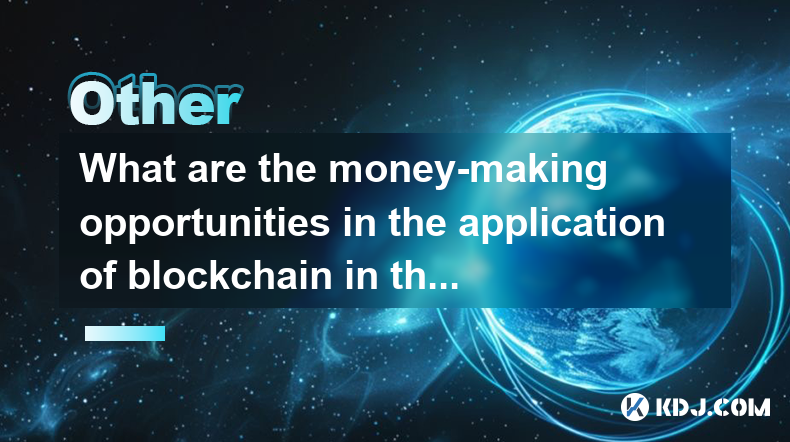
What are the money-making opportunities in the application of blockchain in the medical industry?
Apr 03,2025 at 03:35am
The integration of blockchain technology into the medical industry presents a myriad of money-making opportunities that can revolutionize healthcare systems. Blockchain's inherent characteristics, such as transparency, security, and immutability, make it an ideal solution for various medical applications. By leveraging blockchain, companies can develop ...
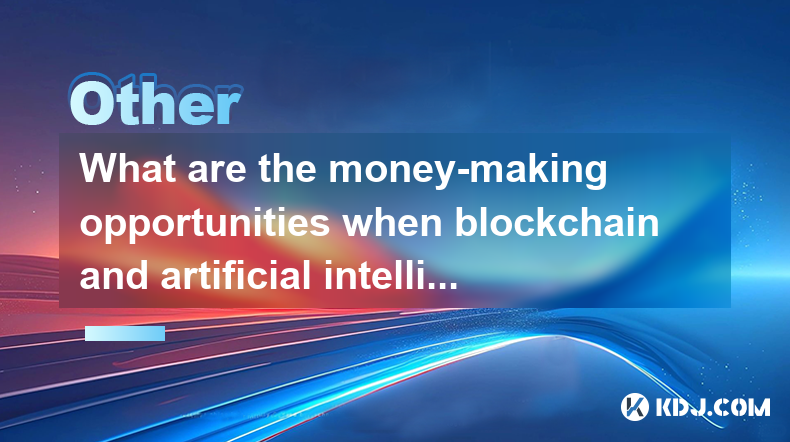
What are the money-making opportunities when blockchain and artificial intelligence are combined?
Apr 04,2025 at 01:28am
The convergence of blockchain and artificial intelligence (AI) presents a myriad of money-making opportunities within the cryptocurrency circle. This fusion leverages the decentralized and secure nature of blockchain with the analytical prowess of AI, creating innovative solutions and platforms that can generate significant revenue. From enhancing tradi...
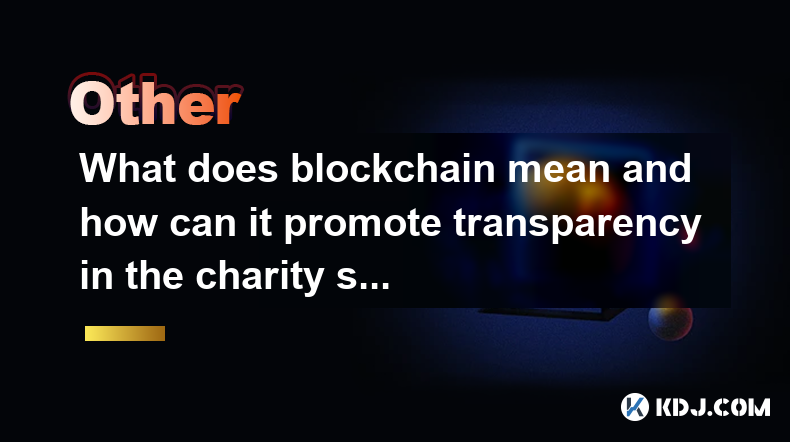
What does blockchain mean and how can it promote transparency in the charity sector?
Apr 03,2025 at 08:29pm
Blockchain technology is a decentralized, distributed ledger that records transactions across numerous computers. This ensures that the data is transparent and nearly impossible to alter retroactively. Essentially, blockchain serves as a digital ledger of all cryptocurrency transactions, enabling secure and direct exchanges without the need for intermed...
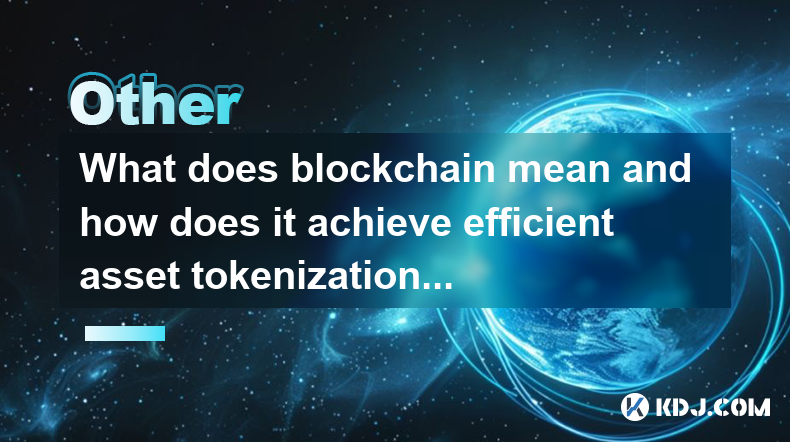
What does blockchain mean and how does it achieve efficient asset tokenization?
Apr 03,2025 at 07:57pm
Blockchain technology is a decentralized, distributed ledger that records transactions across numerous computers. It ensures that each transaction is secure, transparent, and immutable. The concept of blockchain was introduced with the launch of Bitcoin in 2009, but its applications have since expanded far beyond cryptocurrencies. At its core, blockchai...

What are the future development trends of blockchain game development?
Apr 03,2025 at 05:00am
Blockchain technology has revolutionized various industries, and gaming is no exception. As we look to the future, several trends are set to shape the development of blockchain games. These trends not only promise to enhance the gaming experience but also to integrate blockchain technology more seamlessly into the gaming ecosystem. Let's explore these t...

What are the maintenance costs of blockchain system development?
Apr 03,2025 at 06:07pm
The maintenance costs of blockchain system development are multifaceted and depend on various factors. These costs can include technical maintenance, security updates, infrastructure expenses, and personnel costs. Understanding these elements is crucial for anyone planning to develop or maintain a blockchain system. Technical MaintenanceTechnical mainte...

What are the money-making opportunities in the application of blockchain in the medical industry?
Apr 03,2025 at 03:35am
The integration of blockchain technology into the medical industry presents a myriad of money-making opportunities that can revolutionize healthcare systems. Blockchain's inherent characteristics, such as transparency, security, and immutability, make it an ideal solution for various medical applications. By leveraging blockchain, companies can develop ...

What are the money-making opportunities when blockchain and artificial intelligence are combined?
Apr 04,2025 at 01:28am
The convergence of blockchain and artificial intelligence (AI) presents a myriad of money-making opportunities within the cryptocurrency circle. This fusion leverages the decentralized and secure nature of blockchain with the analytical prowess of AI, creating innovative solutions and platforms that can generate significant revenue. From enhancing tradi...

What does blockchain mean and how can it promote transparency in the charity sector?
Apr 03,2025 at 08:29pm
Blockchain technology is a decentralized, distributed ledger that records transactions across numerous computers. This ensures that the data is transparent and nearly impossible to alter retroactively. Essentially, blockchain serves as a digital ledger of all cryptocurrency transactions, enabling secure and direct exchanges without the need for intermed...

What does blockchain mean and how does it achieve efficient asset tokenization?
Apr 03,2025 at 07:57pm
Blockchain technology is a decentralized, distributed ledger that records transactions across numerous computers. It ensures that each transaction is secure, transparent, and immutable. The concept of blockchain was introduced with the launch of Bitcoin in 2009, but its applications have since expanded far beyond cryptocurrencies. At its core, blockchai...
See all articles






















































































